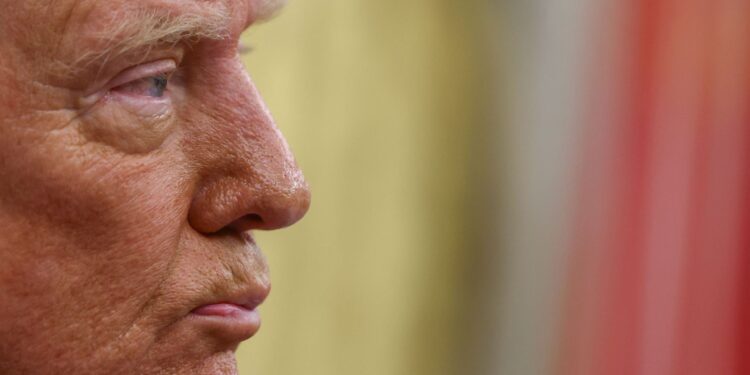After US President Donald Trump promised in his first day at the White House the start of a “golden age” for the US economy, it appears that this promise will take much longer than he promised during his election campaign.
According to a lengthy report published by Bloomberg Agency, his administration officials began to back down from rapid optimism, noting that the economic shift may need “six months to a year” at least in order for its results to appear.
Weak indicators and continuous justifications
“Biden destroyed our country and we will need time to fix what he did,” Trump said in a radio interview with Fox News last February. Treasury Secretary Scott Bessent confirmed that “the country is still suffering from the effects of Bidnvling”, while Trade Minister Howard Lootnick saw that Trump’s full effect will not appear before the last quarter of this year.
But what complicates the situation is the association of the increasing economic risks – from slowing down to the possibilities of recession and even the inflationary recession – with Trump’s policies itself, specifically the wave of new customs duties that are supposed to start on April 2.
The lack of confidence in consumers and markets is declining
Economists believe that Trump’s trade policy fluctuations, especially random customs duties, are among the most prominent reasons for consumer confidence. Michigan University data recorded a sharp decrease in confidence indicators, with a leap in inflation forecast for the highest level since 1993.
This anxiety was also reflected in the market, as Wall Street witnessed losses of $ 5 trillion. According to the “NBC News” poll, the majority of registered voters oppose Trump’s method of managing the economy and the cost of living.
“The current administration has been responsible for this chaos from the moment when it started with the launch of customs threats,” Kimberly Klawsing, a former official at the Biden Ministry, said in a Bidberg.
Trump calls on the federal to intervene
In an attempt to pay attention to the economic deterioration, Trump published yesterday evening Thursday through his platform “Truth Social”: The prices of eggs and gasoline decreased dramatically .. If the federal reserve has reduced interest rates, that will be great !!!
But the Federal Reserve Chief Jerome Powell was not enthusiastic about this invitation, warning that customs duties may hinder the efforts to control inflation.
Who owns the current economy?
Despite Trump’s attempts to evacuate the economic slowdown, consumer spending indicators and retail sales indicate a noticeable weakness, while some indicators – such as factories production – witnessed a slight increase, and the White House explained them as a result of what they described as “local re -manufacturing”, but analysts saw it was just a proactive step to avoid new fees.
“The economy cannot be judged in terms of time, but rather in terms of implementing policies,” said Stephen Miran, head of the Economic Chamber of Economists in the Trump administration.
The Trump administration is trying to accelerate the approval of a series of new tax discounts to alleviate the impact of fees, including exemptions on additional income, bachelor (reward), and social security payments.
But a report from the budget office in Congress concluded that the greatest motivational impact remains for companies ’tax discounts, not for individuals.
Economist Stephanie Ruth warned of the risks of current policies, saying, “Customs duties represent a real risk of inflationary stagnation, and almost any potential benefits of subsequent tax reforms.”
As for the former White House advisor, Peter Navarro, he said that the fees will not be inflated unless it is applied for long periods, noting that “Trump only uses it for negotiating purposes.”
Despite Trump’s attempts and his team to justify the economic slowdown and inflation by holding the previous administration, the current indicators suggest that the American economy, which promised the president to achieve a “economic miracle” in it, may face longer and deeper turmoil than the voters expected, leaving the door open to criticism of political opponents in the next electoral year.



